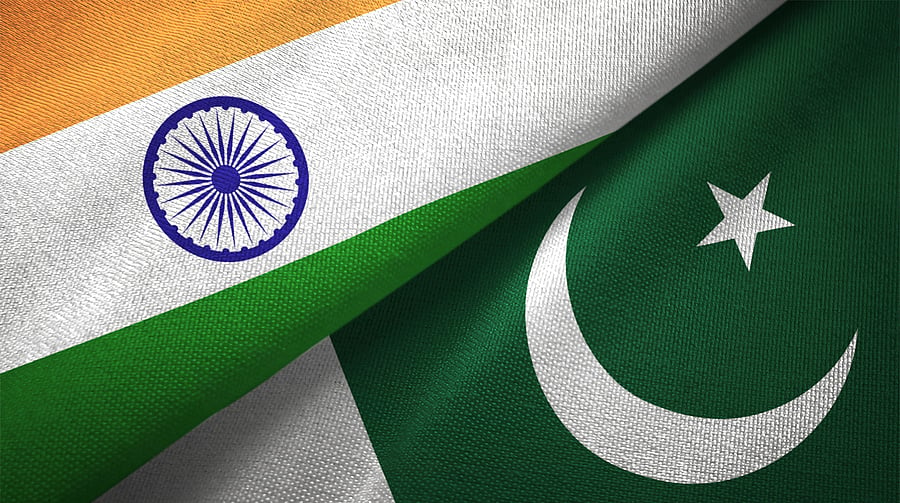
Representative image of India and Pakistan flags.
Credit: iStock Images.
India’s policy of not talking to Pakistan has reached a dead end. Notwithstanding a brief conflict between the two countries following the terror attack in Pahalgam in April, India’s messages on engaging Pakistan have become mixed.
The certainty with which India asserted in Parliament and outside that it would not have any truck with Pakistan after terrorists targeted defence establishments in Pathankot and Uri in 2016 is gone. The ‘no talks’ lobby gained complete control of the Narendra Modi government’s Pakistan policy after the huge Pulwama attack by a suicide bomber which killed two score security personnel.
In the last 10 months, in a significant change, such an inflexible policy has gradually given way to nuanced statements, which keep the door slightly ajar for dialogue with the western neighbour. Ironically, the brief May military exchanges have hastened the process. The expectation was that the conflict would completely shut the door on dialogue.
Former Prime Minister Manmohan Singh, his immediate predecessor Atal Bihari Vajpayee, used back channels before talks, and used S K Lambah and R K Mishra respectively for this purpose. These back channels also explored creative solutions to seemingly intractable disputes.
There is no strategy in the current government on dealing with Pakistan — only tactics. The latest tactics rely on using those outside the government to create sounding boards for a policy shift. A few people are being cautiously deployed to send messages to the international community — specifically to the Donald Trump administration in the United States. The London-based International Institute for Strategic Studies (IISS) said in the latest issue of its monthly journal, Strategic Comments, that “India’s earlier position that ‘terror and talks cannot go together’ is evolving.”
Two weeks ago, Amarjit Singh Dulat, former chief of the Research and Analysis Wing (R&AW) and arguably India’s best Kashmir expert, made a persuasive case in London for resuming dialogue between India and Pakistan. On the sidelines of an event at King’s College, where he promoted his new book, The Chief Minister and the Spy, Dulat took a leaf out of Modi’s own book. “In 2015, Modi visited Pakistan to attend the wedding of Nawaz Sharif’s granddaughter. Someone now needs to bowl first. Imran Khan is in jail. The Field Marshal (Asim Munir) or Prime Minister Shehbaz Sharif can do that.”
What Dulat said about Trump would be music to the ears of the US president. Surely, it would have been conveyed to the White House by the US embassy in London. He described Trump’s role in facilitating a ceasefire as “constructive and result-oriented.”
A source in King’s College sent me the video of Dulat’s interaction. When I tried to watch the video, a message popped up on my laptop screen that “because of an order from the government (of India) related to national security or public order, this content is currently unavailable in this country.” A security source confided that the reference to ‘public order’ meant New Delhi did not want the acclaimed former R&AW chief to be harassed, trolled or threatened the way foreign secretary Vikram Misri and his family had to suffer after he announced the ceasefire.
Dulat has retired. It is often said of intelligence officers that they may leave the service, but the ‘intelligence’ role never leaves them. Some of Dulat’s views in recent years have been contrary to the current New Delhi establishment’s public positions. But as Vajpayee’s trusted adviser on Kashmir, he has credibility with the establishment. Otherwise, Dulat would not have been allowed to publish books or write articles — under the strict rules applicable to former spies — which show streaks of his independent thinking.
Another of India’s respected counter-terrorism experts who dealt with the Khalistan threat has been speaking independently, like Dulat. Ajai Sahni was a protégé of K P S Gill, the head of the Punjab’s police force who helped to subdue secessionism in the state.
As the leader of an all-party delegation of Members of Parliament to the western hemisphere, Congress leader Shashi Tharoor gave multiple interviews last month in the US. He said India can talk to Pakistan if it acts against the terror infrastructure in that country. Defence Minister Rajnath Singh has suggested reopening dialogue with Pakistan if it gives a guarantee that it will stop cross-border terrorism. In the second and fourth weeks of September last year, Singh specifically said so. His is significantly different from the vague, but standard Indian position that terror and talks cannot go together.
The IISS added: “Private and informal dialogues between influential Indian and Pakistani retired officials and experts held in third countries would appear to be one of the few avenues available to discuss ways of diffusing this sharp dispute.” More such nuances can be expected in the run-up to Trump’s arrival in India for the Quad summit. It is a better option than letting Trump take the lead on India-Pakistan talks.
(K P Nayar has extensively covered West Asia and reported from Washington as a foreign correspondent for 15 years)
Disclaimer: The views expressed above are the author's own. They do not necessarily reflect the views of DH.